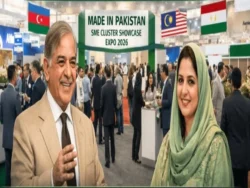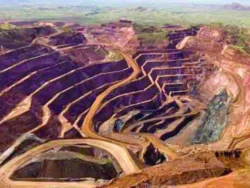Saudi Arabia’s investment role in Pakistan’s mineral resources

August 15, 2023 06:56
Published in: Arab News
The Pakistan government seems determined to capitalize on the mineral sector’s opportunities to increase its GDP growth. Realizing and utilizing this sector’s potential makes locally raw materials available for industrial and economic development.
Besides, the mineral sector attracts a substantial flow of investment in the country, improving hard-currency earnings, increasing government revenues, enhancing job opportunities, improving education and skills development, and developing infrastructure.
Pakistan’s unique geological condition and potential for minerals makes it attractive for foreign investors in the country’s minerals and metals sector. It is endowed with an outcrop area of 600,000 square km, containing 92 known minerals, of which 52 are commercially mined, named coal, copper, gold, chromite, mineral salt, etc.
Despite immense mineral resources, the mineral sector’s contribution to the national economy is insignificant at 2.51 percent. This exposes Pakistan’s inability to manage mineral wealth or attract foreign mineral investment.
– Zafar Nawaz Jaspal
Realistically, despite immense mineral resources, the mineral sector’s contribution to the national economy is insignificant at nearly 2.51 percent. This exposes Pakistan’s inability to manage mineral wealth effectively and attract foreign mineral investment. Nevertheless, a few recent developments have germinated optimism about tapping into its mineral resources. These initiatives demonstrate minerals’ potential and attract exploration and development investment.
The Special Investment Facilitation Council (SIFC) was created in June as part of the new economic revival plan in Pakistan. The Board of Investment Act was amended in the first week of August to legalize SIFC activities. The Council eases the concerns of foreign investors on policy continuity, and asserts that political changes or instability will not cause the discontinuation of, or disruption, in policies. It fosters synergy between the federal and provincial governments. It also facilitates timely decision-making, avoids duplication of efforts, enhances investor confidence, and ensures swift project implementation in agriculture, information technology, mining, and defense production.
Another promising initiative was convening the summit ‘Dust to Development: Investment Opportunities’ in Pakistan on August 2. The summit highlighted the government’s seriousness about tapping mineral and metal resources. It was organized by SIFC and Barrick Gold Corporation and facilitated by the Ministry of Petroleum. The primary objective of the summit was to bring together international investors, mining industry giants, corporate leaders, and government stakeholders to chalk out a roadmap for tapping mineral resources.
Saudi Arabia also intends to invest in Pakistan’s $6 trillion estimated worth of mineral deposits. A Saudi delegation, which included mining company Ma’aden and its new minerals investment venture Manara Minerals, led by Saudi vice minister for mining affairs, Khalid bin Saleh Al-Mudaifer, participated in the mineral summit to explore mineral investment opportunities in Pakistan. Al-Mudaifer said, “The [Saudi] government is mandated to support, help, bring investment and facilitate that investment into Pakistan to build into the relationship between us.”
Saudi Arabia’s interest in Pakistan’s mineral sector is genuine, because it is the world’s fourth-largest net importer of minerals. The demand for minerals in KSA has steadily increased due to ongoing giga-projects and massive industrial transformation initiatives.
KSA’s Public Investment Fund (PIF) seems interested in investing in mining operations at the Reko Diq gold and copper mine project in Balochistan’s Chagai district as well. Presently, Canadian company Barrick Gold owns a 50 percent stake in the Reko Diq mine, with the remaining 50 percent owned by the governments of Pakistan and Balochistan. Last week, SIFC approved the hiring of consultants to reduce the shareholdings of Pakistan and Barrick Gold equally in favor of KSA in the Reko Diq project.
The ensuing challenge is Barrick Gold’s uncompromising approach. It is reluctant to reduce its 50 percent stake. Thus, the SIFC has to adopt a balanced approach, because Canadian and Saudi companies’ investment in the mineral sector is vital for the country. Perhaps one option could be that Saudi Arabia could buy out the equity of the Pakistan government without disturbing Barrick’s share.
Currently, Pakistan is rushing toward mineral extraction. However, policymakers need to realize that mineral resources are non-renewable and specific mineral deposits have a finite life span.
In summary, mining brings extensive economic benefits, provided certain conditions are met, such as an appropriate legal and policy framework, adequate political stability, and well-defined mining rights. Hence, mineral exploration needs reform in Pakistan’s policy space, to make it more investment friendly, improve the law-and-order situation, improve the infrastructure, and employ modern mining technologies.





